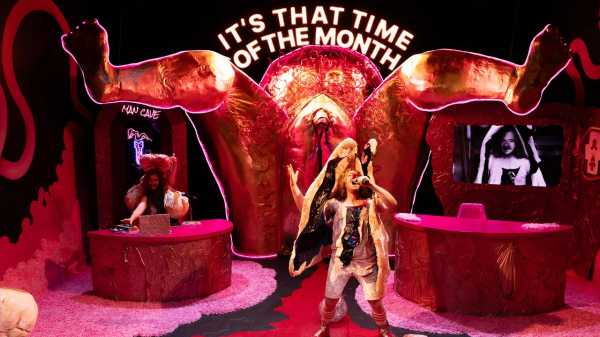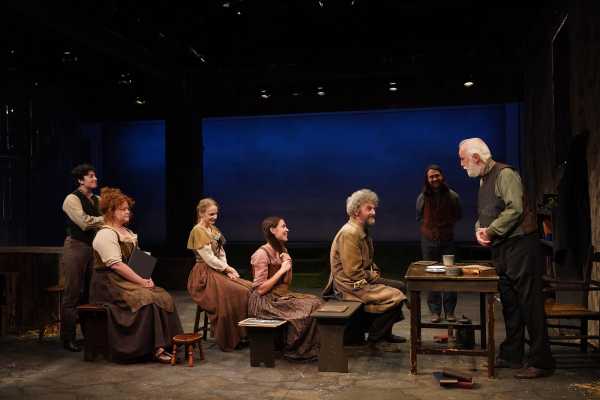
Save this storySave this storySave this storySave this story
Snatch Adams, a six-foot-tall walking vagina working as a red-nose clown, would usually be entertaining folks on the vaudevillian “Borsch” Belt comedy circuit—“borsch” as in (a)bort(ion)—but extremists have been closing Planned Parenthoods. There’s certainly not a lot of other things an unemployed, six-foot-tall vagina-clown can do. Start a podcast? Launch a wellness app? Snatch (Becca Blackwell) and their dear friend Tainty McCracken (Amanda Duarte) experience a flicker of confusion, but then the right idea strikes like a period on a day you’re wearing white pants: air a TV talk show called “It’s That Time of the Month,” which mashes together the best of Conan O’Brien, “Pee-wee’s Playhouse,” and performance artist Carolee Schneemann in her “Interior Scroll” era.
Heretofore, the comic and experimental performer Blackwell’s best-known work was “They, Themself and Schmerm,” an immensely funny standup piece about their transition, which somehow got laughs out of stories about, among other things, childhood molestation. (“Schmerm” is the garbled sound a person might make when trying to say several pronouns at once.) Right before the pandemic shutdown—like, two days before—I saw Blackwell’s chilled-out show “Schmermie’s Choice,” at Joe’s Pub, another autobiographical, standup-flavored set, which explored the giddiness of sex on testosterone, and the ways that various tab A’s fit into various slot B’s. Their latest work, “Snatch Adams & Tainty McCracken Present It’s That Time of the Month,” at SoHo Rep, retains some of Blackwell’s earlier shaggy-dog, low-fi vibe, but here the imagination and the glitz factor have been dialed up to Versailles. This, at last, is Blackwell’s magnum opus, or, to give the collaboratively devised piece its proper due, Blackwell and Duarte’s magnum o-pussy.
Every Johnny needs an Ed, every Conan an Andy, so our host, Snatch—wearing a shell-pink yonic body-taco, complete with sequinned mucus membranes—bounces thoughts off Tainty, a crass, gonadal sidekick, who wears a mustache, two large, pendulous balls that dangle around his shoulders, and, on his head, an anus that resembles a ruched sofa cushion. (Amanda Villalobos did the original design for both of our leading genitalia.) The bantering pair sit at matching desks, though Snatch sometimes wanders into the crowd for some affirmative consent-style participation. The show feels loose and seemingly unscripted, though Blackwell and Duarte are credited as writers, and it was directed, thrillingly, by Jess Barbagallo. The trio’s combined strength lies in creating and controlling a gently permissive queer mayhem, with Blackwell’s soft-spoken diffidence giving way to Duarte’s joke-swinging insult comedy. (Their respective affects are reminiscent of Big Bird and Oscar the Grouch.) “Oh, sure, let’s make it about you,” Snatch said kindly, the night I saw it, when Tainty interrupted with comments about his temporarily missing penis. It wasn’t mean, or even passive-aggressive; Snatch just loves to listen.
Snatch and Tainty’s wonderful fake television show doesn’t air, exactly, so much as gestate inside a gorgeously baroque, pink-and-gilt set, designed by Greg Corbino, which features a chapel-size model of a lower body, with a throbbing, door-like vagina dead center, bracketed by huge golden legs. When guests on “It’s That Time of the Month” visit with Snatch, they sit in ovary-shaped chairs that detach from two elaborate fallopian tubes glued to the wall; and when audience members compete in games, as in a race to figure out how to fasten a sanitary belt, or the hit-Snatch-with-a-herpes-sore challenge, they might stand on helpfully provided silicone blood-clot mats. (The Pyramid Club has closed in the East Village, but its sweet, sticky, pharaonic-splendor-made-from-trash spirit lives on.)
And hey, why is it so rare to talk about menstruation? That squeamishness in our still-puritan public sphere takes on a specific menace when one considers, for example, that Florida legislators have tried to ban discussion of menarche at school. You can trace a direct line from fear about periods to the desire to regulate bodies and the ways they express themselves. Everyone on set certainly knows about that line. There’s pain in Snatch’s voice during a ripped-from-Jay-Leno-style bit about so-called “funny headlines”; they read several that refer to the increasing number of anti-trans and anti-abortion bills—and are not actually funny at all.
When Blackwell, their hair pulled back and wearing street clothes, arrives as a guest of Snatch’s show (this requires a quick-change and some magic by the video designer Nicholas Zeig-Owens), the tone pivots from high camp to candor. Blackwell performs a little standup but mostly focusses on telling us what they’ve learned from their transition. “I lived successfully as a woman, now I live successfully as a man,” Blackwell says. “And, you know what, they’re the same. Because I’m the same.” Certainly, a few of the folks in the audience had to be coached through a few basics, like the exact location of the clitoris, but Snatch and Tainty insist that it’s actually quite easy to understand one another’s holes and non-holes, as long as we’re willing to stop attaching so much shame to them. And, gosh, imagine if this is what our late-night shows had been telling us all along. We leave the theatre through a narrow pink tunnel—and it’s enough to make you feel reborn.
Speaking of seeming binaries that shift and melt, a revival of Brian Friel’s “Translations,” the first offering in a season devoted to work by the Irish dramatist at the Irish Repertory Theatre, is all about permeable boundaries—the lines between eras, countries, languages, and constructions of mind and identity. Friel’s beautifully modulated drama, from 1980, takes place in 1833, in an Irish hedge school in Baile Beag (or Ballybeg). Such informal institutions were common, prior to the full nationalization of schools, as a response to the repression of Catholic education. In the tiny community of Baile Beag, lessons bend to the hedge teacher’s whim—and, in this case, the white-bearded schoolmaster Hugh (Seán McGinley) loves the classics. His students work out their sums in chalk, or study maps, but they’re also catechized in Latin and Greek, and his star pupil, the eccentric Jimmy Jack (John Keating) seems to live deep in myth itself, dreaming of a “flashing-eyed Athene,” the goddess who might, he says—half-joking, half-sure—come share his loneliness.
But, of course, change is coming. Friel is unsubtle about this: the famine will arrive in just a few years, and characters are already worried about the possibility of blight. British soldiers with red coats and cut-glass accents come stomping into the school, unable to understand the Irish-speaking locals, eager to ascertain certain property lines so that taxes can be more efficiently collected. Hugh’s sons are neatly split by dramaturgical necessity: Manus (Owen Campbell) is a caretaker son, gentle and dedicated to tradition, whereas the prodigal one, Owen (Seth Numrich), has thrown his lot in with the colonizing English-speakers, aiding in their surveying work by giving new, Anglicized names to the local rills and roads.

The hedge school of “Translations.”Photograph courtesy Carol Rosegg
In an effort to maximize the romance and erudition of lost-in-time Baile Beag, Friel has us believe that the soldiers can’t understand the Latin spoken to them, even when Lieutenant Yolland (dashing Raffi Barsoumian) very much wants to hear what the local beauty Maire (Mary Wiseman) has to say. But surely any officer in the King’s army would have been force-fed Virgil at school? Friel’s larger point—one about the way words can make a world but cannot make a welcome—is one he paints in more delicate colors. Just as you’ve been lulled into believing you’re watching a jolly clash-of-cultures romance, tragedy rears up. We should have known from hearing so much of the Aeneid in his characters’ mouths: violence and heartbreak happens in that story also.
Doug Hughes directs an exquisite production. Charlie Corcoran’s set, which is mostly a stretch of sky above a low grass hill, shimmers like nacre; Michael Gottlieb’s lighting design, particularly in the play’s final, stunning moment with Hugh, is finely shaded, before plunging into a spotlit darkness reminiscent of Caravaggio. The theatre at the Irish Rep is quite small, and the director keeps his company in severe check, so that even a drunken scene (Owen and Yolland swill poteen together) never rises to the level of a shout. This leashed quality amplifies Friel’s affectionate and sorrowful characterizations, as well as his extraordinary tension, for instance, in the lovely, foolish seduction scene at the end of the first act. Yolland, speaking English, and Maire, whose lines are in English but whom we perceive as speaking Irish, can barely say “sorry” to each other without misunderstanding. Their actual exchange of troth must happen in glances, and then, ruinously, they are understood in a different way, when they’re seen by a girl on the hill. This choreography of looks requires a thick atmosphere, in the same way a light beam needs smoke to be visible. Hughes and his tremendous cast fill the room with that atmosphere, to the point that we can almost see thoughts darting between people—or, as poor, blithe, almost-mad Jimmy Jack might, Athena brandishing her spear in the gray air. ♦
Sourse: newyorker.com
